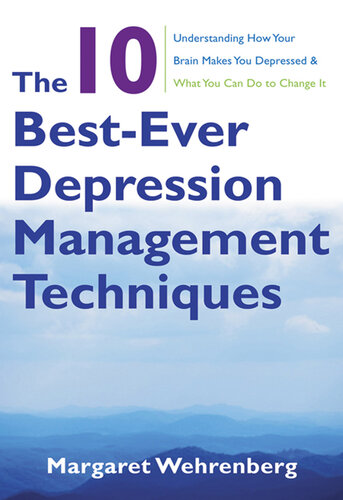
The 10 Best-Ever Depression Management Techniques
Understanding How Your Brain Makes You Depressed and What You Can Do to Change It
کتاب های مرتبط
- اطلاعات
- نقد و بررسی
- دیدگاه کاربران
نقد و بررسی

December 1, 2010
Using the "ten best ever" outline featured in her previous works on anxiety and stress, clinical psychologist Wehrenberg offers suggestions for managing depression that are easy to understand and implement. Describing brain functions using research from neuroscience, she explains how medication and cognitive therapy change the way the brain controls depression. Wehrenberg identifies three types of depression, shows how to recognize triggering thoughts and events, and gives strategies for managing and controlling symptoms. Acknowledging that there is no standard formula for controlling depression, she urges readers to try techniques and indicates when professional intervention may be needed. Guidelines are given for checking destructive behavior, managing stress (especially stress associated with technology), reframing negative thoughts, and ending isolation. Emphasis throughout is on developing a positive worldview. Work sheets and resources are included in appendixes. VERDICT Wehrenberg offers excellent step-by-step suggestions for people suffering from depression who want to make changes in their lives.--Lucille M. Boone, San Jose P.L., CA
Copyright 2010 Library Journal, LLC Used with permission.

December 15, 2010
People suffering from clinical depression and who feel that they are to blame for their debility may take comfort in psychologist Wehrenbergs deconstruction of the depressed brain. In language that is unavoidably technically complicated on occasion, she explains how the intricate workings of the physical brain affect the emotions, not only causing and sustaining depression, but reinforcing it as well. She also describes how the different types of prescription medications work on the brains chemical processes to help alleviate depressions symptoms. As a practicing psychologist, Wehrenberg additionally promotes the added benefit of talk therapy. But recognizing that not everyone has means to access a licensed therapist, she offers some of her own tried-and-true methods for self-help. Appendixes include additional reading plus a number of charts, questionnaires, and graphs to guide readers in their recovery efforts. In steps that are both clear and scaled for easily attainable victories, Wehrenberg extends a hand to those without the recourse of clinical therapy.(Reprinted with permission of Booklist, copyright 2010, American Library Association.)

























دیدگاه کاربران